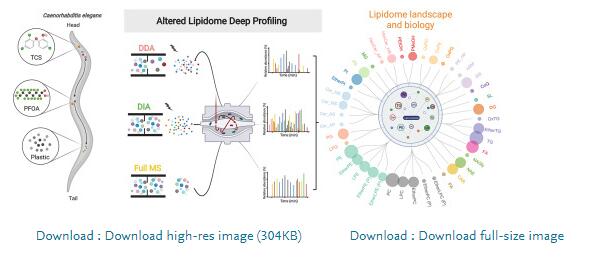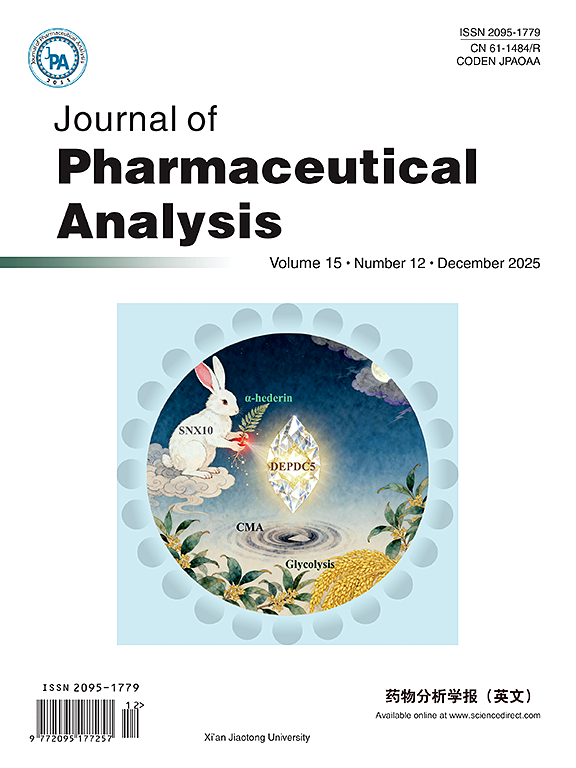, Available online , doi: 10.1016/j.jpha.2025.101447
Abstract:
Damaged skin is prone to infection and impaired healing, making efficient wound care materials critical. Polysaccharide-based self-healing hydrogels have demonstrated significant potential in skin regeneration due to their biocompatibility, biodegradability, and ability to mimic the extracellular matrix (ECM). This review summarizes the fabrication techniques, core polysaccharide materials, and challenges of these hydrogels. Hydrogel preparation primarily involves chemical cross-linking, physical cross-linking, and three-dimensional (3D) bioprinting. Chemical cross-linking confers high mechanical strength but limited self-healing capacity, while physical cross-linking enables rapid self-healing via dynamic non-covalent interactions, responsive to stimuli like pH and temperature. 3D bioprinting allows customizable tissue-like structures with precise control over cell distribution and bioactive molecule release. Key polysaccharides include alginate, chitosan, hyaluronic acid (HA), cellulose, and dextran. Alginate forms reversible networks via calcium ion cross-linking, suitable for wound dressings and tissue engineering. Chitosan, with amino and hydroxyl groups, exhibits antibacterial activity and promotes cell proliferation, widely used in infected wounds. HA achieves self-healing through dynamic covalent bonds, accelerating collagen deposition and angiogenesis. Cellulose derivatives employ boronic ester or Schiff base linkages for self-healing systems in injectable formulations. Dextran utilizes Diels-Alder reactions for self-healing under physiological conditions, ideal for drug delivery. Commercial products like HyStem® and Chitogel® have entered clinical use, integrating growth factors or antimicrobials to enhance wound healing. However, challenges persist, including insufficient mechanical strength, mismatched degradation rates with healing processes, long-term safety concerns, and scalability. Future directions focus on "smart" hydrogels, combined with clustered regularly interspaced short palindromic repeats (CRISPR) gene editing or artificial intelligence (AI)-optimized design, to enhance functionality and clinical translation.

00031-65ab19f10-8614-478e-9861-800898fa63d2.jpg)
00027-434ad4b11-a11e-472a-9850-98e036a9adc8.jpg)
00019-57738d854-ed91-4127-b061-47338e13973c.jpg)
00020-126d30c63-fdce-4fc2-b039-683335b57ad1.jpg)
00018-3baeea3ab-a054-4030-ba75-4a75fe2bd6a8.jpg)
00016-X1fea2909-c4df-449f-bf38-252ed5b60243.jpg)
00015-8c52c23ae-1a4b-4593-bfb1-30dea0b60992.jpg)
00017-16743306a-2b27-4958-af38-c9790acd7975.jpg)
00014-6cce5770f-92a3-48f8-ad6b-ffda7617abde.jpg)
00010-93033248d-eb3f-4807-9858-acf818b7f97f.jpg)
00013-471dc62a5-88f1-4512-9ef7-17d4c0ac8274.jpg)
00012-269de809a-d087-47cd-89cc-5f96873e17b7.jpg)
00011-0960d9461-e802-4eb1-b3c6-4e0d59fa12b0.jpg)
00008-00811237b-1ed7-44b7-95ee-d417bf0f1deb.jpg)
00009-23901e3b2-1005-44e5-a6fe-d8b3b5046c1c.jpg)
00007-9c285957d-3187-4453-bdc4-1dd827fd7402.jpg)
00006-797ec53c6-09f0-4e3a-98ec-b7d2adb46f9d.jpg)
00355-7d22879d3-9a8a-464e-811b-bf26be565d09.jpg)
00002-X86745ee6-71e4-4706-9f36-81dd814729d0.jpg)
00005-56f09e76e-4357-48b9-95e2-8c253f351d57.jpg)
00004-3fde01bc6-3b4a-4ff4-8c3a-b07d3bf5e299.jpg)
00356-961d42a87-9418-4f78-aef6-01b15ba43c39.jpg)
00357-0f5634e5f-8487-4f2c-b58d-28b66a017705.jpg)
00003-1a1f2d725-d7f7-43d3-8ccd-4e9c3b351738.jpg)
00001-845048059-9fb1-400e-acdd-b9c1a586dc80.jpg)
00362-4ca867f29-47dd-4339-be09-222bc7c8620f.jpg)
00360-08eb8eb9d-a6a7-4203-bf15-9eb412c62f37.jpg)
00361-2e6348812-124a-4a3a-b0d3-7214205939fd.jpg)
00359-413940084-3871-41ef-9495-483dda3f44e8.jpg)
00358-24d036166-f624-46ce-857f-cf86fab12279.jpg)
00351-X546e3ca9-7c6b-47b4-b21c-5f73a21e4bc3.jpg)
00350-8eefcd607-fc64-4409-865b-a6f53e9981a0.jpg)
00353-35aa03c3d-6e1c-404f-be73-2dd1c324ddce.jpg)
00354-5242a913d-a987-4304-8bbe-78250d5af61c.jpg)
00352-1260ed2cd-b326-4f14-85d3-28ec2ddbff53.jpg)
00347-856395dd7-4258-4e9d-b096-f7f89ee0db07.jpg)
00349-1510b1b40-10a2-4270-9bd1-1d2ec9cb123b.jpg)
00348-Xa05557fe-43ea-4505-beff-7ade42a0f930.jpg)
00339-97977aef9-58ea-4d35-b32f-0f6096fc7226.png)
00337-520da676e-74e8-4f01-a473-6dd60d14e5c5.jpg)
00333-8943625cd-a989-4f9f-9aae-c3c733a8fcab.jpg)
00338-75ec44c12-eedc-4ed7-ab32-9f008eeb7888.jpg)
00336-3703266bf-b5aa-4eb0-8d65-29f9cc3b5b3e.jpg)
00335-1342646c4-89ad-48c8-ba0e-29706da28b32.jpg)
00329-6fd8ce5f9-9170-46fc-8404-f1b095af126e.jpg)
00328-4b720adff-643a-4a26-884c-0c947acece5a.jpg)
00331-4ca183471-0275-4979-b16c-bd2bd835bf91.jpg)
00332-612e606a9-84d3-45f6-a2ae-73f1250a0bbf.jpg)
00330-21c9385a6-74fa-456c-a804-054953b7af60.jpg)
00327-2650a0307-c211-47f9-8ef7-ed4f5041f3c8.png)
00326-09d39f96d-31ea-466b-b7d9-7722a242b31e.jpg)
00324-779428be7-6287-467d-92aa-1bb5cffad581.jpg)
00325-9e15b6e58-3e8c-43ab-a034-721cccba4828.jpg)
00317-X980b75e9-1ae7-4cd5-a84e-2eb66cb6c6fb.jpg)
00315-61edb2567-278a-46e1-ad7d-86ca197fca75.png)
00316-81fee3af6-8249-48ea-85b1-f074017ef443.jpg)
00312-07dceeafd-26dd-4ed5-830c-0ca4a16c8250.jpg)
00313-2542b124b-00f6-46dd-956b-5c15191cbe9c.jpg)
00311-9b0373eb9-d4af-4f12-ad4b-dc942ea04dd3.jpg)
00310-77f8b64f9-b2ea-4ece-8899-4891ef49eb0c.png)
00305-3e4718fc4-4024-44b6-8474-f6a0707238a8.png)
00306-5edd3ca00-2e68-4d9e-93b5-9a8bd369131a.png)
00309-033dd4958-d788-44bf-acd7-64c8f21eac1c.png)
00308-9a1f429dc-0c45-473a-bb16-6b09ee81b880.png)
00307-7e7e73f15-7865-4526-8bc1-4016d5af15b2.png)
00296-5c860e122-c13a-4c58-b4e0-b2c6039fade4.jpg)
00295-35de6652d-cce9-44c6-8688-35ce3db66a93.jpg)
00293-X6af56caa-4f75-4c72-9fd4-677b686afbc9.jpg)
00292-8e1ecc973-ca15-4c64-ac0a-325b1f73b6c7.jpg)
00288-6af01fea1-24f6-42ff-adb5-d497399b81ec.jpg)
00291-6d8fda571-8c4b-4c6b-b7d0-00e37afe0701.jpg)
00289-82efec746-138a-42ba-a2ee-4427dc106faa.jpg)
00290-4cc2f67d1-5bae-4ed6-993e-632752558728.jpg)
00287-44b22e3f6-c1c1-46cf-8b7f-7b61e3d0d75e.jpg)
00285-09f8db5db-3e89-4715-b927-47b09bac9d6e.jpg)
00286-2f4a6d74d-e739-497d-86fd-aa15a169ad90.jpg)
00275-824edc785-2f68-4ce5-a005-00fec0e56e2a.jpg)
00284-919411a53-288a-4c13-a547-2d4a44667d21.jpg)
00283-7e2414739-d6e1-4505-aed3-0de276cbda2e.jpg)
00274-6119dd85f-c390-42c5-b47a-071f197788bb.jpg)
00269-2fbb10b56-b2ba-4478-a2db-23340babc3f1.jpg)
00272-2f28ab04e-5af9-4739-94d0-b24a14f2a230.jpg)
00273-49b1b26b7-ae6c-46ab-aaae-b6bf7f3fdad1.jpg)
00270-988a16b60-1252-45e3-b067-08d41584570b.jpg)
00271-0bc1c790f-f797-4014-bfcf-f89a470c1fb7.jpg)
00266-7f8e34419-77b2-4d00-b79a-e59887b6e3b1.png)
00268-01e62a827-d0ee-41cc-a174-f555f57990b0.png)
00267-941b7db87-bf91-4033-87bd-a261b6f049b0.jpg)
00263-1237592e6-c2d9-48b6-8937-5d5bceba6c58.jpg)
00264-3dc73b7ed-134b-4279-975a-690d1a3adca5.jpg)
00247-37020edfd-7cfe-465a-92c8-0a9eec573137.png)
00251-50644a3db-e4fb-47c2-83be-f8b898bd63e6.jpg)
00250-3fb9f528d-f43e-4712-a3ed-28e54408c3ba.jpg)
00246-19c87c9ab-2f1d-4e96-9898-a808f00aeaf9.jpg)
00249-7bfa5fe5d-5f0c-4984-a1f3-23a6fc903e5d.jpg)
00252-76c335a28-1e95-4a6f-a871-79d25e6ea86e.jpg)
00248-5e52e3b31-7d3e-47e1-a426-41457cc649dd.jpg)
00244-84d93c0ae-40fe-483c-a8eb-2eb45898bfbd.jpg)
00243-6a4d971ff-255c-4e0c-930f-f8bed5e72ff7.png)
00245-X5f9fdb04-64a9-4e16-bb10-fa755735a87d.png)
00231-X7e058afb-074b-4fa6-ac80-d0ed1fcd47bb.jpg)
00242-497a419b2-f45d-4a4e-8b90-78d1c9dd1d1c.jpg)
00234-5db98f63e-747e-401a-89ef-d3f69f7158c4.jpg)
00233-3d4515aae-c223-4fd4-b4c2-c451881e28f1.jpg)
00225-4a2e980f4-8210-4bd7-866b-2f71cfffcf30.jpg)
00232-167ee244c-09ca-4d59-8f1c-187ce98bc5cd.jpg)
00229-136e954dc-f994-4538-9a1c-ffe71c671bd8.jpg)
00226-6fc081e83-9573-4fcd-b213-ea612759ff80.jpg)
00223-0d33d8363-6aad-4e9f-8a36-2b0eb13f4c91.jpg)
00224-2df07d442-d535-4f0d-b91c-bb2f5e8e54ad.jpg)
00217-58a501cb9-298f-4810-b50a-dbc9ed3eac82.jpg)
00222-992ba5638-c716-4958-a154-81618e745089.jpg)
00216-396f62339-4f41-4a14-9a59-f299652a2a4e.jpg)
00221-746d7d2c2-18a7-4fe8-b9f3-5d32118ecab0.jpg)
00219-955469bfa-6267-4315-8259-a7f1929b80d5.jpg)
00218-78400c68b-bc4b-4f13-bb61-109546aee26e.jpg)
00215-1b3554f74-b645-4dba-a8f4-816e7c8e74aa.jpg)
00214-X4af2dc96-91e6-4457-83af-6462e3d53180.jpg)
00213-89ac5d16f-b6db-40f8-a88b-3e2610417e91.jpg)
00202-3979b58b9-8aae-48e0-a9e4-eeae6ebb0ab3.jpg)
00199-6392faed2-bb47-4077-a096-ff980c0bb9bb.jpg)
00196-0b51a3880-e9e7-4f6a-ab22-2b481e085189.jpg)
00198-4e178b692-31ad-4744-aa5b-937af8226989.jpg)
00201-1907360ea-44b5-43e4-8975-3c00853c7cdd.jpg)
00194-70de47622-ed1a-4860-aca7-bdd77fe4a606.jpg)
00192-325b6cec6-ea99-457a-8efc-22969c8df0ef.jpg)
00193-52f1edafa-6f19-4e88-a664-098e85efe77a.jpg)
00190-X21fbfe64-1222-4741-9865-eea25a4f3cca.jpg)
00191-13b984c61-321d-4abd-aae5-db74e5237dd3.jpg)
00187-X24b4c02a-33ba-4baa-8fd4-e8d9bcfa4198.jpg)
00188-17418f296-f8d3-4b91-af1c-16379df42e47.jpg)
00189-340476c70-f9dc-465e-9933-7cf8b85fac0d.jpg)
00186-83ac88f96-c288-416d-822a-33d1f7d2d123.jpg)
00173-X937bcbb0-c50f-4765-8d6e-8e3519f125d1.jpg)
00172-864718ab0-949a-4716-9915-0edafb2dc4f6.jpg)
00171-60058175c-dc7a-4612-b4e0-796d157b79cb.jpg)
00174-119087794-4f43-4a49-9fb7-e6dc023ff5c9.jpg)
00170-4d233df06-f24f-4313-a542-a6535a49b991.jpg)
00175-31b197857-4d29-4de6-943d-fd9dbf92ab62.jpg)
00169-8de26eea3-a704-411e-8379-fd681de9e2f7.jpg)
00167-4764b8298-5480-4fd1-bca0-fc9c25479076.jpg)
00166-20cb5e257-887f-42cb-9d54-23b3b56abdcf.jpg)
00162-52da50107-19d6-40bd-bac1-3d525ca735fc.jpg)
00163-7cb207bbf-7e11-4c30-bc53-b32a7e791737.jpg)
00156-X35398f61-b325-427a-818e-4a56ce1dd716.jpg)
00152-249a6b4d6-a64b-4839-806c-c4c7a5b7b436.jpg)
00157-1d59133f9-6086-4441-bbc6-730a5439791e.jpg)
00123-666762d44-8627-4e04-929e-bd3be1f89e2e.jpg)
00112-1800a1d6d-6f29-44a4-97ee-9ded94956461.jpg)
00076-0a8251cf9-c1a1-4ff0-9f9b-91fef71390f3.jpg)
00073-52894da48-f204-4909-8c12-23879b0c26f5.jpg)
00041-37bae1c95-5dc7-4768-9c5f-d7265eb6683a.jpg)
00216-26d1be2bd-4ca0-4a60-8129-fd2acbe7e9b5.jpg)

00314-4e09de230-8217-437c-bd44-b1095a9a3e59.jpg)


